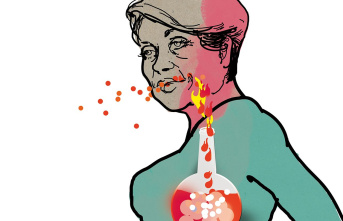Traffic with trains, buses and planes in Germany has largely come to a standstill. A major warning strike by the EVG railway union and Verdi has been going on since midnight.
Millions of commuters and travelers as well as large parts of freight transport are affected by the 24-hour industrial dispute. Larger traffic jams in addition to the usual obstructions in rush-hour traffic were only occasionally reported by the police in the morning. There was talk of slow traffic, but without major restrictions as a result of the major strike. Many commuters probably stayed in the home office, it said.
Long-distance rail traffic has been completely discontinued and regional traffic has largely been discontinued for the time being. Almost all German airports are on strike. Waterways and ports as well as the motorway company are also affected. Public transport is also on strike in seven federal states.
With the all-day warning strikes, the Verdi union and the railway and transport union (EVG) want to increase the pressure in their collective bargaining. Parallel to the strike, trade unions and employers in the public sector will meet again this Monday for talks. At the EVG, further negotiations with Deutsche Bahn and other railway companies will take place later.
Verdi boss Frank Werneke emphasized: "The strike day in the transport sector should once again make it unmistakably clear to employers that the employees clearly support our demands." Regarding allegations by the employers that the warning strikes were a burden on the negotiations, Werneke said: "Public sector employees, including those in the middle income groups, see the enormous price increases for electricity, gas and food as a particular burden."
EVG boss: Necessary and proportionate
From the point of view of the chairman of the railway and transport union (EVG), Martin Burkert, the warning strikes in the transport sector are "necessary and proportionate". "The important thing now is that this industry must not be left behind by general wage developments," said Burkert on Monday in Potsdam. The third round of negotiations in the public service between the federal government, local authorities and the Verdi trade union, which had called for industrial action together with the EVG, begins in the morning.
"We are determined to push through our demands for 650 euros for all employment groups, alternatively 12 percent," stressed Burkert with a view to the company's own wage negotiations in the railway industry, which are also to be continued this week. "We expect an offer that meets our demands and, above all, no counter-offers."
The President of the Association of Municipal Employers' Associations, Karin Welge, criticized the walkout. "We already agreed last year to come together in three rounds of negotiations. And that's why the massiveness of the strikes before the third round of negotiations is clearly surprising," she said on the radio station Bayern 2. She would also like a deal, said Welge . "I'm assuming at this point in time that we'll succeed."
The head of the civil servants' association dbb, Ulrich Silberbach, warned against an expansion of the labor disputes. "Either we cut the knot and find an agreement, or we face another wave of escalation and strikes," he told the German Press Agency.
Criticism came again from Deutsche Bahn. "Millions of passengers who rely on buses and trains are suffering from this exaggerated, exaggerated strike," said a railway spokesman. "Not everyone can work from their home office." Thousands of companies that received or sent their goods by rail also had disadvantages: "The winners of the day are the mineral oil companies."
Rail
The EVG strikes the long-distance, regional and S-Bahn traffic. Long-distance traffic has been discontinued, most of regional traffic at least since the start of the strike. According to Deutsche Bahn, whether individual lines will be included in regional traffic in the afternoon depends on the course of the strike. Effects should also be felt on Tuesday. Private railways that were not on strike were also affected because employees in the DB Netz signal boxes went on strike.
airports
The airports are largely struck by Verdi. According to the airport association ADV, 380,000 business and private travelers have to stay on the ground. The largest airport in Frankfurt and Munich Airport, which ceased operations on Sunday, are also affected. The capital's airport BER was not included in the warning strike. But since almost all other German airports are on strike, all domestic German flights were canceled there. The airports are expecting heavier occupancy on Tuesday.
local transport
Local transport is again on strike in the federal states that are directly linked to the collective agreement for the public sector. These are Baden-Württemberg, Hesse, Lower Saxony, North Rhine-Westphalia, Rhineland-Palatinate and Saxony. There is also a strike in Bavaria, where a collective agreement for local transport is being negotiated. Several countries said that students should stay at home if they cannot come to school.
Strike day at the start of the third wage round
Verdi and the civil servants' association dbb wanted to resume negotiations for 2.5 million employees with the federal government and the municipalities in Potsdam today. Before the third round, both sides were still far apart, but an agreement is possible in the next few days.
More collective bargaining
The background to the labor disputes are various wage disputes. At the EVG, there are further talks with various railway companies from the middle of the week. Negotiations with Deutsche Bahn should only continue after Easter. At airports, municipal public service employees are involved, but local negotiations for ground handling services and nationwide discussions for aviation security are also involved. The coordinated approach met with severe criticism from employers - the strikes for the population were no longer recognizable as a pure warning strike.











